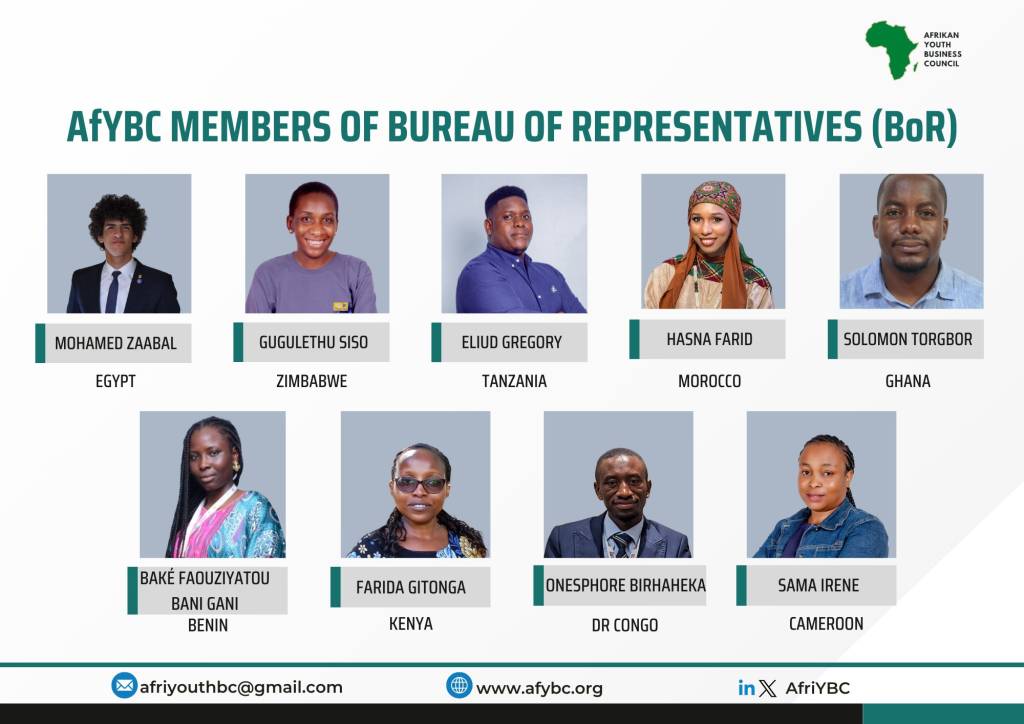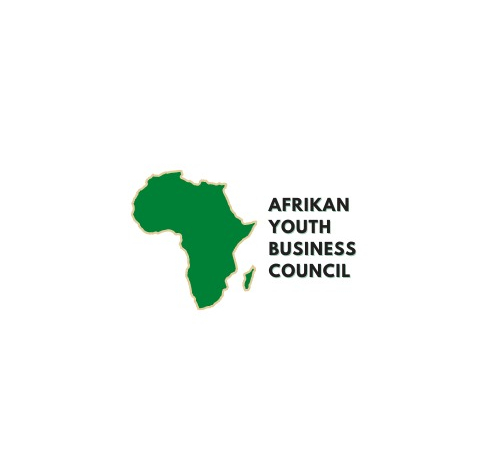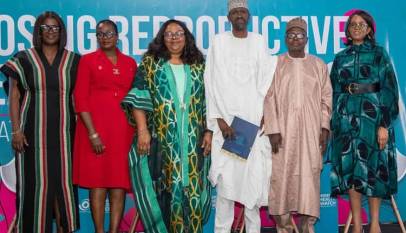AfYBC: Mainstreaming Young Entrepreneurs in Africa’s Trade Agenda
Afrikan Youth Business Council (AfYBC), the apex continental youth-led private sector body and voice for young entrepreneurs and youth-led businesses, recently inaugurated the pioneer members of its Bureau of Representatives (BoR), who serve as the link between the Council and Africa’s constituency of youth in business, trade and enterprise.

The AfYBC is the leading youth-led continental private sector umbrella organisation that uplifts young entrepreneurs and their businesses, advocates for a youth-friendly economic and trade policy regime, promotes fair trade, fair competition, and connectivity for young African entrepreneurs to meaningfully participate in national and intra-African under the Africa Continental Free Trade Area (AfCFTA) trade.
The Council’s core objectives are promoting a popular front for youth-led entrepreneurship that results in commercially meaningful national and intra-African trade activity as a pathway to job creation (for youth) especially under the AfCFTA trade regime. In addition, it fosters an inclusive, youth-friendly business policy and practice environment that addresses common barriers to successful youth-led entrepreneurship such as inadequate financing, market hegemony, burdensome tax and policy and regulatory regimes.
The newly constituted Bureau of Representatives (BoR) comprises twelve under-40 African entrepreneurs and business owners, representing the five regions of Africa and the sixth region (African Diaspora). The BoR members serve as a critical link between the Council and its wider community of youth in business, trade, and enterprise, as well as ensuring the Council’s policy and program priorities are aligned to the needs of AfYBC members.
In her goodwill message, Lily Sommer, AfCFTA Programme Manager at the International Trade Centre (ITC), said it was always inspiring to see young people taking the lead in trade and business. She commended the AfCFTA Secretariat for the recent adoption of the Women and Youth in Trade Protocol under the AfCFTA and credited the AfYBC and other youth-led bodies for their efforts in promoting the inclusion of young entrepreneurs under the AfCFTA regime.
“The ITC is committed to advancing the youth agenda in Africa through our youth in trade programme created to empower youth through entrepreneurship opportunities, technical skills training and market linkages. Since the onset of the AfCFTA, ITC has remained committed to supporting youth to prosper through regional trade. We are fully committed to working with the AfYBC to support the action needed to translate the Women and Youth Protocol into a tangible impact at national level,” she said.
Ms Sommer said over the years, the ITC has forged strong partnerships that delivered results for youth in trade in Africa, working with the AU Commission and AfCFTA Secretariat. “Let me take this opportunity to applaud the incredible work of the AfYBC for all its milestones so far including the highly successful enterprise development webinar series. ITC stands ready to support the AfYBC in its upcoming endeavors including through our upcoming collaborations at the AfCFTA Youth Symposium and 3rd African Union MSMEs Forum.”
In her goodwill message, Ms Grace Mugabekazi, the Acting Head of Youth Connekt Africa, expressed Youth Conneckt’s commitment to resolving issues related to access to opportunities, employment, and enabling dignified lives for young people. She applauded the AfYBC as a pioneer network of African entrepreneurs and expressed optimism about the potential of the current generation of young Africans to transform Africa’s economic future.
“We are your partners in ensuring that there is a systemic change on the African continent by enabling youth in trade to thrive. We want to collaborate with you. I wish to commend the AfYBC for taking the initiative to build a non-existent network of young African entrepreneurs. We hope that this body will take up the mandate to advocate for youth-led businesses,” she told the new AfYBC BoR members.
“If there was ever a generation with the capacity to overcome what is holding Africa back, it is this generation. We believe in empowering young people and doing so systematically. Over the last few years, we have seen Africa unite around the operationalization of the AfCFTA framework and the excitement of young enterpreneurs about the AfCFTA and their determination not to be limited by national borders,” Ms Mugabekazi noted.
In her goodwill message, Ms Gonaya Monei Sethora, a Women and Youth in Trade Expert at the AfCFTA Secretariat, expressed the Secretariat’s interest in collaborating with AfYBC to operationalise the Women and Youth Protocol and engage young people in business under the AfCFTA.
Ms Sethora stated the AfCFTA Secretariat’s interest in partnering the AfYBC to build a database of young African entrepreneurs as a basis for the Secretariat and development partners to engage young entrepreneurs under the AfCFTA. To this end, she recommended to young African entrepreneurs the ITC’s online AfCFTA Export Training Programme for African SMEs which empowers SMEs with the knowledge to effectively leverage the AfCFTA market.
“I am glad to inform you that we are currently working with AU Member States to develop a Ministerial Regulation on Preferential Market Access for Women and Youth in Trade as one of the first implementation strategies for the AfCFTA Protocol for Women and Youth. It is within the ministerial regulation that we see the potential of developing a continental Simplified Trade Regime (STR) for small-scale traders in Africa,” she concluded.
In his goodwill message, Mr Sekou Berete, Team Leader of the Technical Assistance Facility to support the AfCFTA and Continental Economic Integration (EU TAF) project, emphasized the essential role of youth in the implementation of economic policies at national, regional and continental levels and underscored the role of AfCFTA Women and Youth Protocol in mainstreaming young people in Africa’s trade agenda.
“The AfCFTA provides an opportunity for young people to enhance their participation in achieving an industrialized Africa in line with Agenda 2063. This can be achieved through inclusive innovation, entrepreneurship, and sustainable trade development initiatives. The AfCFTA must be aligned with national policies and programs to allow the youth access to regional supply chains and different opportunities in public and private sectors so as to empower them to play a key role in the AfCFTA process,” he noted.
Mr Berete described the recent adoption of the AfCFTA Women and Youth in Trade Protocol as the first step towards fostering youth inclusion in intra-African trade, ending the discrimination of young people and ensuring a level playing field for all. “We recognize the vital role of various actors such as the AfYBC in advocating for youth inclusion in the AfCFTA policymaking process. We are working with the AfCFTA Secretariat to provide targeted support aimed at strengthening the participation of youth in the AfCFTA trade policy process.”
In his goodwill message, Andrew Karamagi of the MS Training Centre for Development Cooperation (MS TCDC), AfYBC’s fiscal sponsor, highlighted the persistent inequalities and unsafe practices in Africa’s trade space. “We must understand why our continent’s economy isn’t turning around despite the advocacies and campaigns that have been ongoing since pre-independence,” he said, raising critical questions about the continent’s high import bill, balance of payment issues, and overdependence on finished imports.
Karamagi therefore stressed the need for practical actions beyond enacting documents like the AfCFTA and its protocols. “It is apparent that we need to do more than enact documents; we need immediate wins,” he asserted and called for the need to address concerns about currency exchange rates, mass transport systems, and intellectual property rights as well as the need for a comprehensive overhaul of Africa’s business agenda.
“When and how can we have a new currency that can facilitate trade in the whole of Africa without the menace of a currency exchange rate that is determined and controlled by the United States Federal Reserve? When will we reclaim our continent’s business agenda from the International Monetary Fund, the World Bank and its associates?” Karamagi asked, emphasizing the need for a proactive approach to these challenges.
The newly inaugurated AfYBC BoR members are accomplished Under 40 African entrepreneurs who will serve a two-year term (2024 – 2026). They included Solomon Nii Sai Torgbor and Bani gani baké Faouziyatou (West Africa); Eliud Canicius Gregory and Farida K Gitonga (East Africa); Gugulethu Siso (Southern Africa); Sama Ongonbibu Irene and Cirhuza Birhaheka Onesphore (Central Africa); Hasna Farid and Mohamed Osama Zaabal (North Africa).
















